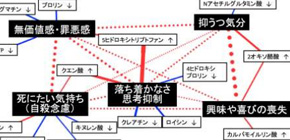
Plasma metabolites related to the severity of depression and suicidal ideation identified
A step toward to the development of objective diagnosis methods for depression
Depression has various symptoms such as a depressive feeling, lowering of motivation (loss of pleasure and motivation), feelings of guilt, and suicidal ideation (SI), and carries a high risk of suicide. So evaluation of the severity of depression (SOD) is essential. Conventionally, SOD was evaluated using clinical interviews by specialists based on subjective information from a person.
Under the sponsorship of Japan Agency for Medical Research and Development, a group of researchers led by Professor KANBA Shigenobu , Specially Appointed Associate Professor KATO Takahiro , Professor Kang Dongchon , and Assistant Professor SETOYAMA Daiki at the Faculty of Medical Sciences, Kyushu University, Associate Professor HASHIMOTO Ryota at United Graduate School of Child Development, Osaka University, and Department Manager KUNUGI Hiroshi and HATTORI Kotaro at the National Institute of Neuroscience, National Center of Neurology and Psychiatry, discovered metabolites related to SI and that metabolites varied by symptom, such as feelings of guilty and SI.
Using metabolome analysis for measuring a variety of metabolites from a small amount of blood component, this group discovered plasma metabolites (3-hydroxybutyrate acid and betaine) that are associated with SOD from the blood of patients with depressive symptoms (major depressive disorder (MDD) and bipolar disorder (BD)). This group also discovered that metabolites associated with respective symptoms, such as feelings of guilty and SI, were different and developed a pilot algorithm for estimating a grade of SI.
For treatment of depression, early discovery and early intervention is crucial; however, most patients consult a psychiatrist first. Based on this group’s achievement, if it becomes possible to perform objective evaluation of depression at medical institutes or medical checkups in the future, it will become possible to detect and intervene in depression at an early stage, contributing to public mental health. Furthermore, examination of dynamics of metabolites discovered in this study will lead to the clarification of the clinical condition of depression. Development of food with adjusted metabolic dynamics and new treatment drugs is anticipated.
Abstract
Evaluating the severity of depression (SOD), especially suicidal ideation (SI), is crucial in the treatment of not only patients with mood disorders but also psychiatric patients in general. SOD has been assessed on interviews such as the Hamilton Rating Scale for Depression (HAMD)-17, and/or self-administered questionnaires such as the Patient Health Questionnaire (PHQ)-9. However, these evaluation systems have relied on a person’s subjective information, which sometimes lead to difficulties in clinical settings. To resolve this limitation, a more objective SOD evaluation system is needed. Herein, we collected clinical data including HAMD-17/PHQ-9 and blood plasma of psychiatric patients from three independent clinical centers. We performed metabolome analysis of blood plasma using liquid chromatography mass spectrometry (LC-MS), and 123 metabolites were detected. Interestingly, five plasma metabolites (3-hydroxybutyrate (3HB), betaine, citrate, creatinine, and gamma-aminobutyric acid (GABA)) are commonly associated with SOD in all three independent cohort sets regardless of the presence or absence of medication and diagnostic difference. In addition, we have shown several metabolites are independently associated with sub-symptoms of depression including SI. We successfully created a classification model to discriminate depressive patients with or without SI by machine learning technique. Finally, we produced a pilot algorithm to predict a grade of SI with citrate and kynurenine. The above metabolites may have strongly been associated with the underlying novel biological pathophysiology of SOD. We should explore the biological impact of these metabolites on depressive symptoms by utilizing a cross species study model with human and rodents. The present multicenter pilot study offers a potential utility for measuring blood metabolites as a novel objective tool for not only assessing SOD but also evaluating therapeutic efficacy in clinical practice. In addition, modification of these metabolites by diet and/or medications may be a novel therapeutic target for depression. To clarify these aspects, clinical trials measuring metabolites before/after interventions should be conducted. Larger cohort studies including non-clinical subjects are also warranted to clarify our pilot findings.

Figure 1 - Correlation networks between sub-symptoms of depression and plasma metabolites in depressive patients (The bolder the lines, the stronger the correlation between connected nodes is.)

Table 1
To learn more about this research, please view the full research report entitled “: Plasma metabolites predict severity of depression and suicidal ideation in psychiatric patients-A multicenter pilot analysis ” at this page of the PLOS ONE website.
Related link
